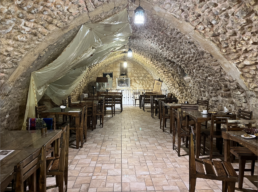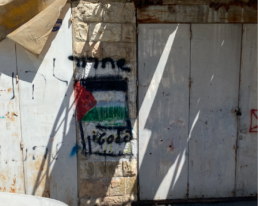Jerusalem Cafe Owner Turns Down Millions for Property with Secret Tunnel to Holy Sites
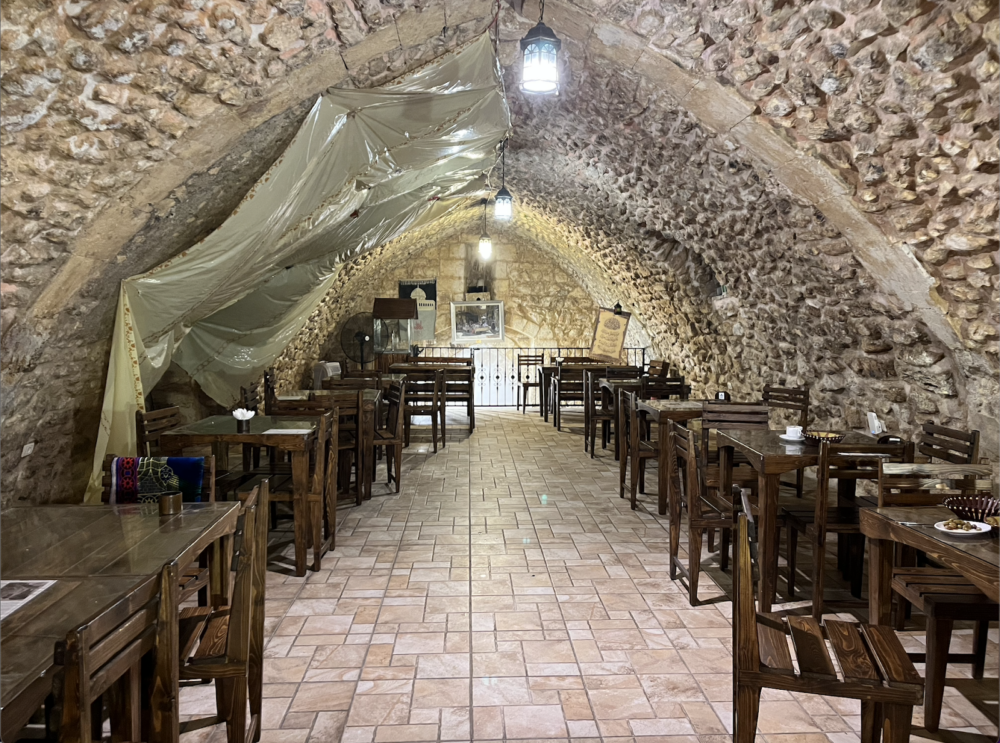
JERUSALEM -- On a Wednesday in March, Emad Abu Khadija was preparing baklava, sahlab, and Turkish coffee for customers at his cafe in the Old City of Jerusalem when Israeli soldiers arrived. It was another sporadic check on the 1,000-year-old tunnels that exist beneath the Khan Abu Khadija Cafe, which reportedly lead to several of the city’s most holy, and heavily guarded, sites: The Dome of the Rock (Al Aqsa Mosque), the Church of the Holy Sepulcher, the Western Wall, and to Damascus Gate.
“The police come almost every week and check down there — they put signs on the walls and take photos to see if anything changed,” Abdullah Abu Khadijah said.
Khan Abu Khadija Cafe stands approximately 20 meters away— a less than five-minute-walk— from the Al Aqsa Compound, also referred to as the Temple Mount. For decades the Abu Khadija family has welcomed waves of locals, foreigners, pilgrims and tourists into their small clothing shop, and, eventually, cafe – and many have no idea a historic relic lies beneath them.
Khan Abu Khadija Cafe began as a small market where Emad’s father and grandfather cleaned clothes and sold some local goods. About 30 years ago, Emad began to expand his cafe, hoping to turn it into a larger restaurant. He labored for hours nearly every week with his younger sons, removing rubble, heavy rocks and dirt. It was during this expansion project that Emad first discovered ancient walls behind his family’s original shop.
In 2017, three years before Emad’s father died, he told his father that he heard “echoes or double-voices,” Emad said, but his father brushed off his concerns. Emad steadily continued to work toward his dream of converting the family cafe into a restaurant. He carefully broke down more of his shop's gray and beige-brick walls, continued to manually remove rubble, and, eventually, began to level out the floors by shoveling deeper. In the back of his mind, he said, he continued to wonder what was causing the echoes. It wasn’t until Emad and his sons expanded through more layers of rocks and began the flooring process of his long-desired new space that he discovered an entryway into the ancient tunnel.
Archaeologists and historians believe this tunnel was formerly used as two roads during the Ayyubid Period in the late 12th century, according to local media reports. The tunnel itself is wide with Byzantine and Arabesque archways and passageways, but it is not passable because it is closed off by stones and rubble. In video recordings from Emad and videos taken by local Arab news outlets, seven closed-off underground pathways are visible.
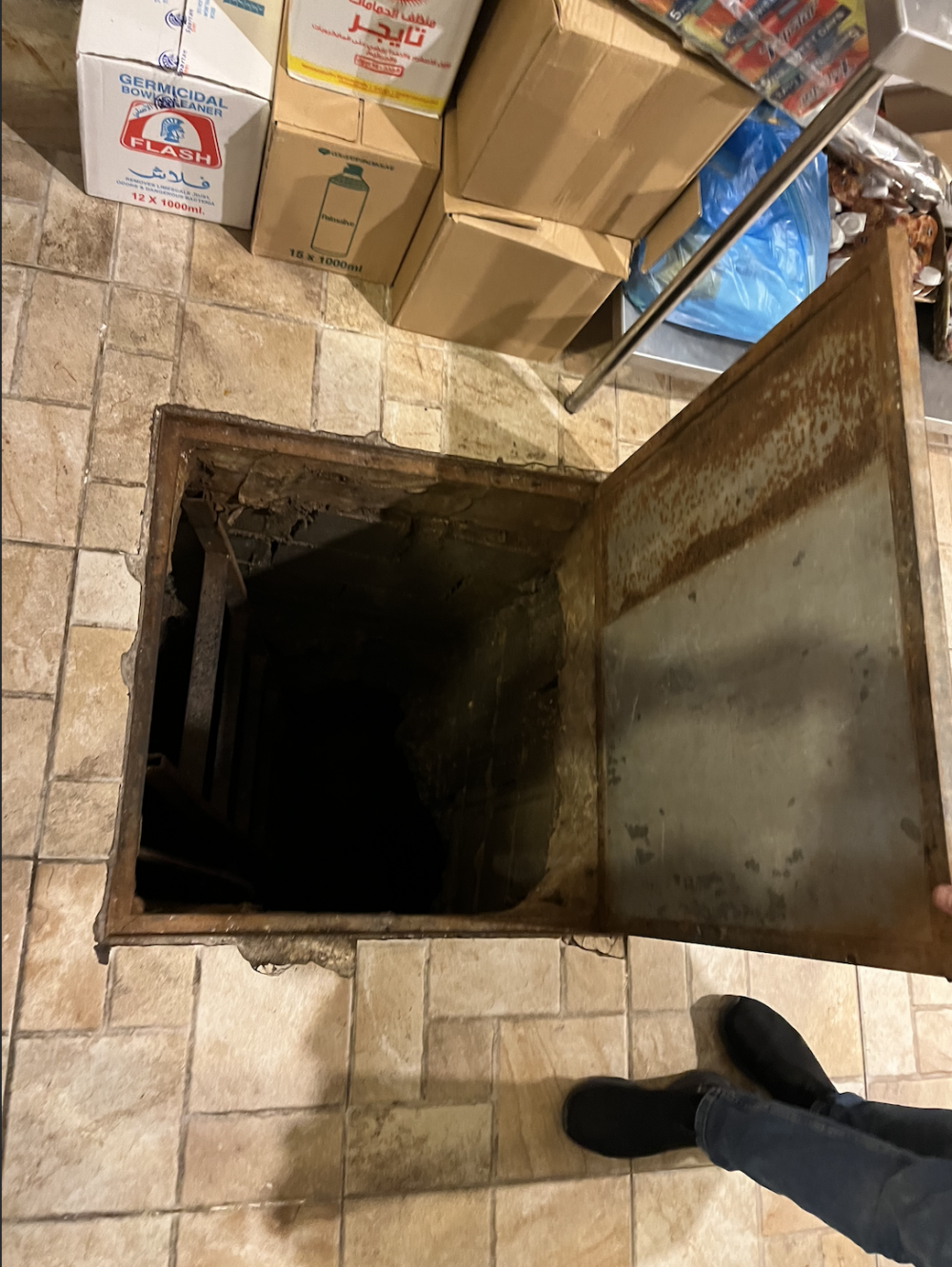
In 2018, Emad Abu Khadija said, the Israeli government and the Israeli Antiquities Authority offered to buy the property from him for $24 million. He refused to make the sale. In 2022, they upped the price to $31 million and, most recently, a few months ago, to $40 million. Emad said that there’s no price high enough for the property.
“Even if they offered me hundreds of millions more, I would not sell,” Emad said.
According to the Israeli Antiquities Authority’s website, the agency is “responsible for all antiquities of the country, including underwater finds.” It adds: “It is authorized to excavate, preserve, conserve, and administrate antiquities when necessary.”
But Emad believes that the historic find beneath his restaurant should be protected and kept within the control of Palestinians. As a Muslim Palestinian, Emad said that this is part of his purpose in life — this is his “duty to the ummah,” the Muslim community.
Emad’s childhood and that of his sons took place within the confined walls of this property. “I have my family history inside this café,” he said.

The Khan Abu Khadija Cafe property has remained in the family for 93 years, according to Emad. He has memories of helping his father, Ishaq, and his grandfather, Abdulrahman, sell goods at the small market, and taking a less-than-10-minute walk to his home, which is also in the Muslim Quarter of Jerusalem.
“I was born right next to Al Aqsa Mosque,” Emad said. “Alhamdulillah,” he said.“Praise be to God.”
Emad remembers working hard as a child and as a young adult to help his family, taking breaks only during Islamic prayer times, he said.
Salim Tamari, a senior fellow in history and sociology at the Institute for Palestine Studies, said he has very rarely come across family shops existing inside or on top of ancient assets today. “The Israeli Antiquities Authority and archaeological journals on Jerusalem have already discovered so much over time,” Tamari said. “Jerusalem is built on layers —the archways and historic roads that many archaeologists find underneath the ground today signify Roman and Byzantine times, like what this cafe seems to have underneath it.”
Emad believes his discovery must “be a gift from God,” he said.
Throughout Emad’s expansion project, he has been arrested and fined for continuing construction inside his cafe. He has been heavily taxed. He has spent thousands of shekels trying to get the Israeli court system to approve of his application to expand and renovate his restaurant.
The average cost for a licensing restaurant application fee in the Old City is 500 shekels, Emad said, “but I have spent 17,000 shekels just in the last four years and until now the Israeli court hasn’t given me the license.”
Emad and his son Abdullah believe the constant delays, costs, fees, and arrests to all be a tactic by the Israeli government. “They are trying to take this place from us in any way,” Abdullah said. “We go to jail, we work, and we still pay the government — we are working, working, working, working, just to live another day.”
Some fundraising campaigns on Facebook, Instagram, and other social media platforms have taken place in support of Emad and his family over the years. One fundraising campaign created in 2016, titled “Save Emad’s Store Near Al-Aqsa,” raised nearly $1,500..
In an Arabic-language video posted for this fundraising campaign, Emad said, “My only wish is to preserve ancient Islamic art in this modern time. My dream is to open a restaurant that serves the Al Aqsa Mosque and the poor,” he continued.
These videos and social media posts attracted many viewers from around the world, Emad said, including more tourists and pilgrims who visited his cafe after hearing about this news. The Turkish Cooperation and Coordination Agency, a government organization that provides foreign aid to more than 150 countries, including the Palestinian territories, was especially moved by the news circulating about Emad Abu Khadija.
The Turkish agency “helps a lot of people here in the Old City,” Abdullah said of the Turkish agency “They said to us: ‘Just keep your cafe and we will help you.’” Anytime the Abu Khadija family does construction work, they must notify Israeli authorities, who monitor them to prevent damage to any of the ancient findings. This costs Emad 1,600 shekels for every construction project in his cafe — a cost covered by the Turkish agency.
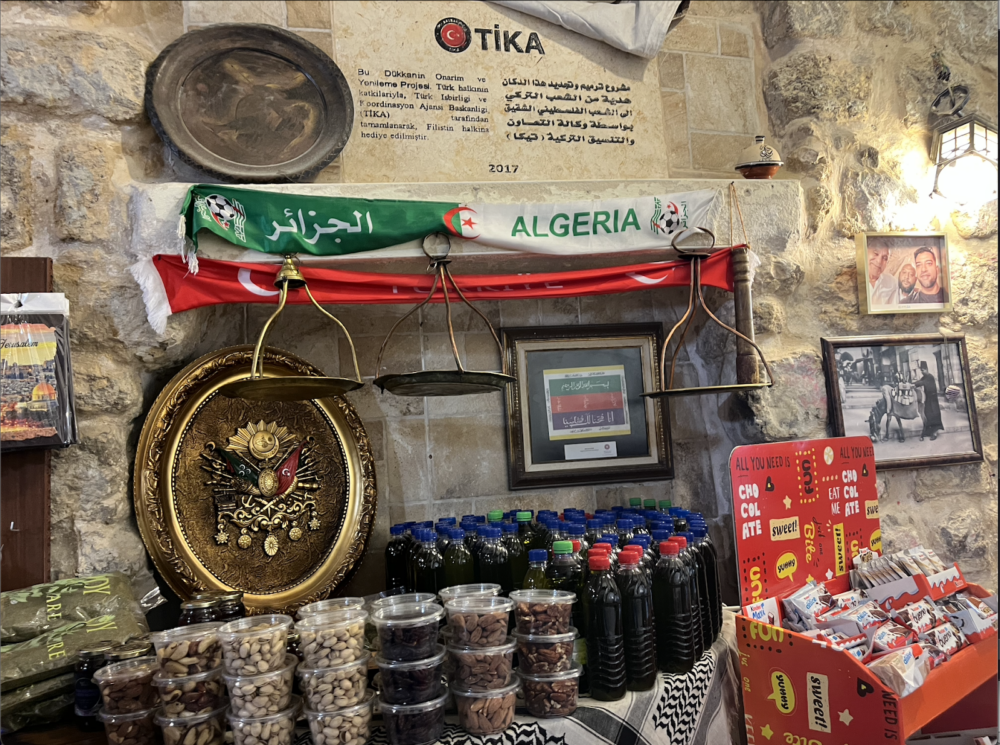
While the total monetary aid to the Khan Abu Khadija Cafe remains unclear, the Turkish agency continues to send volunteers, pays the Israelis for monitoring construction, has covered costs of renovation in the cafe, and raises awareness about the Abu Khadija’s efforts to keep this property within the family and to help realize Emad’s dream to open a restaurant.
Serdar Cam, the president of the Turkish agency, said to the Daily Sabah, a Turkish publication, they not only contribute to the restoration work for Palestinian communities, but they also “provide development aid for Palestinians, such as development employment, vocational courses, projects in the field of health and the strengthening of educational opportunities by opening schools.”
During the Islamic holy month of Ramadan, the Khan Abu Khadija Cafe is open for 24 hours. Volunteers from around the world, especially from Turkey, aid the family and help prepare meals to donate to locals. The only times Emad said he sits down is when his family and friends break their fasts together right after praying Maghrib in Al Aqsa Mosque, and then again during suhoor, the Muslim pre-dawn meal, before the sunrise (Fajr) prayer.
Family memories, traditions, and history, like these during Ramadan, continue to fuel their decision to not accept the recent offers for their café.
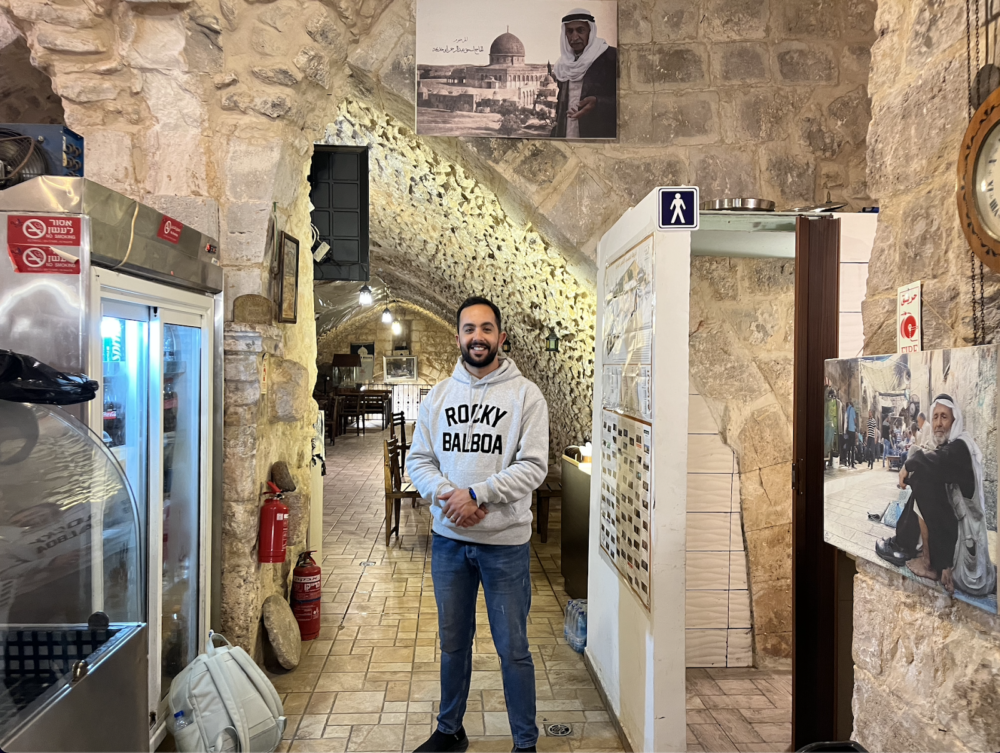
“‘I spent all of my life, 90 years here, but I can't make it,” Abdullah’s grandfather, Ishaq, told him in Arabic a few months before his passing. “Now your father will take care of it and you must after your father. We must keep it generation after generation.”
The Writing on the Wall: Palestinian Flags in Ultra-Orthodox Neighborhood
JERUSALEM – Dozens of Palestinian flags are painted up and down the ancient walls. The red, green, black and white colors of the flag adorn the outsides of buildings, walls and doors. But this is not the West Bank or Gaza. These flags are painted in the heart of Jerusalem, in one of the most ultra-Orthodox neighborhoods in all of Israel.
Welcome to Mea She'arim, just a short walk from the Old City of Jerusalem. Inside its narrow winding passages is one of the first Jewish neighborhoods built outside the Old City. Dating back to the Ottoman Empire, this community is home to many who not only reject Zionism, or Jewish nationalism, but go so far as to claim the state of Israel should not exist at all based solely on their religious interpretation.
Moshe Lef, a 25-year-old store owner living in the heart of Mea She’arim, believes that the country belongs to the Palestinian people. “We want to go to the Palestinian[s] and live good with each other, like our grandparents did.”
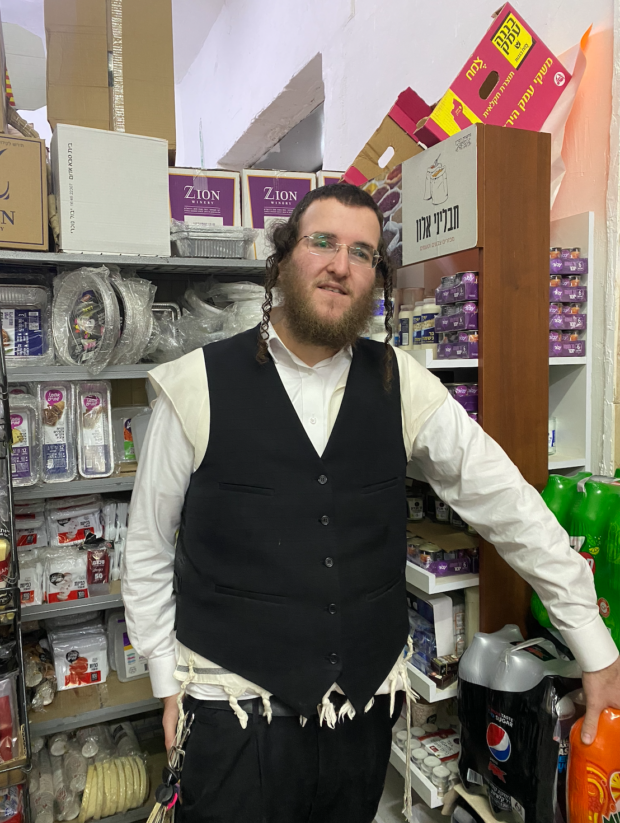
Lef, who comes from a family of Jews who were living peacefully in Jerusalem before Israel was formed, cited his family’s peaceful coexistence with Palestinians – even sharing an apartment with a Palestinian family in the decades ago. Lef claimed to be a sixth-generation resident of Mea She'arim, part of a community that predates the modern state of Israel and goes back to Lithuanian and Eastern European Jews that migrated to Jerusalem in the late 1800s.
“We believe this country is [the Palestinians’] and we didn’t want the state of Israel to exist in this country,” he said.
Lef wears a traditional black vest over a white button-down shirt with the tassels of his tzitzis poking out underneath. His peyot, the long curls of hair that many Orthodox Jews keep, fall over the sides of his mostly unkempt beard. By all outward appearances, Lef seems much like any of the other 1.2 million ultra-Orthodox Jews that make up around 13% of the population of Israel. But while many Haredi (ultra-Orthodox) and others living within the wider Mea She’arim neighborhood are ambivalent about the state of Israel and cooperate with it, Lef is part of a small Haredi movement called Edah Haredit that has been very anti-Zionist, based on their interpretation of the Torah, since the group was founded in the 1820s, according to Kimmy Caplan, professor of Jewish history at Bar-Ilan University.
The Edah Haredit is known as one of the most hardline groups even among the already very-traditional Haredi community, Caplan said. In the last 20 years, many Edah community members have grown even more outspoken about their views, Caplan added, partially in response criticism from within the ultra-Orthodox community of Edah Haredit’s opposition to the state of Israel.
In an interview near his store, Lef elaborated on the group’s core religious beliefs that fuel the its ideology. “We are waiting for the Messiah to come,” he said, adding that only then will God give power to those who believe in Judaism. Until then, “we think that the state of Israel is against the Bible” and that a Jewish state, especially a secular one, should not exist.
Lef’s religious beliefs put him in direct opposition to the state of Israel and its existence. Curiously, it also puts him in line with Palestinians opposition of the state and in violation of laws around showing support for Palestine.
Israel’s new right-wing government has banned the public display of the Palestinian flag and has stepped up enforcement. Israel’s National Security Minister Itamar Ben-Gvir announced via Twitter that he had directed police to enforce the removal of these flags and to “stop any incitement against the State of Israel.” Outreach to Ben-Gvir’s office to comment on the Palestinian Flags in Mea She'arim went unanswered.
Lef said he believes the flags his community paints save lives and serve as protection for the community. “We don’t have a fight with the Palestinians,” said Lef. “Even in the most horrible times in Israel” when there were attacks and bombings in every neighborhood, places like Mea She’arim were quiet, he said. “We believe that the reason is because we say we are not in a fight with the Palestinians”.
Not only do Lef and those in the Edah Haredit completely reject the Israeli state. Lef claimed that those in the Edah Haredit community take no Israeli government assistance, use only private health insurance and even avoid registering their children with the state if possible. “We don’t travel with the bus” and acccept “not the childcare, not the money, nothing. We are autonomous in all things.” Lef explained. Caplan confirmed that this is often the case in this hardline community.
While Lef said that the community’s fight with the Israeli government is ideological, it has clashed with the Israeli state and police. Protests in Mea She'arim around the route of the light rail line running through ultra-Orthodox neighborhoods have at times gotten violent. There have also been cases of arson, vandalism and violence where the police have been called in as the community protests perceived threats to their way of life.
Given the insularity of the community, its size can be difficult to pin down. Nationwide, Professor Caplan estimated the community is between 30,000 and 40,000 people, roughly 2-3% of the ultra-Orthodox community. While the community is also spread out across Israel and abroad both Lef and Professor Caplan point out the greatest concentration and the heart of the movement is still within Mea She'arim community.
The community’s insular nature has concealed their anti-Zionist stance and affinity for Palestinian flags from many Israelis. Daniel Kleinman, an Israeli security guard at an Israeli government building mere steps away from Mea She’arim, had never heard of or seen the Palestinian flags. He was surprised to learn of their existence just behind the community’s walls, noting “that would be very strange” here in Jerusalem. Professor Caplan also noted while the community is not quiet about their beliefs, that many in Israel might be unaware of their views.

